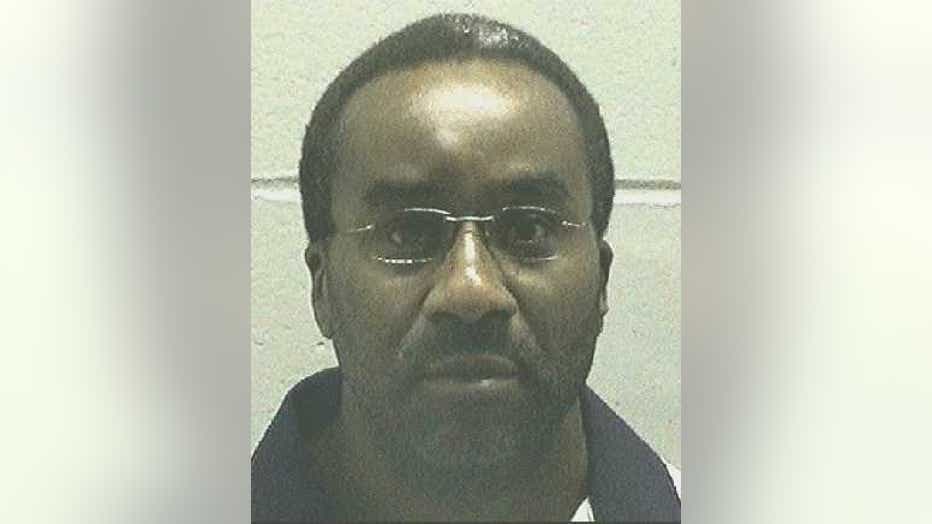Georgia prepares to execute man for 1994 murder of store clerk
THOMAS COUNTY, Ga. - Prison officials in Georgia are preparing to execute a man Wednesday evening for the fatal shooting of a convenience store clerk 25 years ago.

Georgia inmate to be executed for 1994 murder
Ray Jefferson Cromartie is scheduled for a lethal injection at the state prison in Jackson on Wednesday.
Ray Jefferson Cromartie, 52, is scheduled for a lethal injection at the state prison in Jackson. He was convicted of malice murder and sentenced to death for the April 1994 killing of 50-year-old Richard Slysz in Thomasville, just inside Georgia's southern border.
The state says Cromartie also shot and gravely injured another convenience store clerk a few days earlier.
Cromartie insists he didn't shoot either clerk, according to his attorneys. They've asked state and federal courts to allow DNA testing of evidence collected from the shootings that they say could prove he wasn't the shooter. The state has argued that the DNA evidence they are seeking couldn't prove his innocence.
Courts have, so far, rejected the requests for DNA testing.
Evidence at trial showed Cromartie borrowed a handgun from his cousin on April 7, 1994, entered the Madison Street Deli that night and shot clerk Dan Wilson in the face, seriously injuring him.
MORE: Georgia Supreme Court denies request to stop inmate's execution
Wilson couldn't describe the person who shot him and surveillance camera footage wasn't clear enough to conclusively identify the shooter.
Days later, on April 10, Cromartie and Corey Clark asked Thaddeus Lucas to drive them to a different store to steal beer, testimony showed. Lucas parked and the other two entered the Junior Food Store.
Cromartie shot Slysz twice in the head, prosecutors say. Unable to open the cash register, Cromartie and Clark fled after Cromartie grabbed two 12-packs of beer.
In both cases, Cromartie told others he had shot the clerks, evidence showed.

Ray Jefferson Cromartie (Georgia Department of Corrections / Supplied)
Lucas and Clark testified against Cromartie at the September 1997 trial that ended with his death sentence. Lucas and Clark each pleaded guilty to lesser charges, served prison time and were released.
Cromartie's lawyers are seeking DNA testing on evidence, including shell casings from both shootings; clothing found near the first shooting site; a package of cigarettes found near Slysz's body; and clothing samples from Slysz and from other people they say are potential shooters.
MORE: New execution date set for Georgia inmate
The DNA testing could prove Cromartie wasn't the shooter, his lawyers argue. If he wasn't the shooter, he couldn't be guilty of malice murder, the conviction for which he was sentenced to death, they've written in court filings.
They've also released two letters from Slysz's daughter, Elizabeth Legette, supporting the DNA testing.
A judge last month found that it's unlikely the DNA testing would lead to a different verdict. The judge also said Cromartie waited too long to ask for the testing and failed to show that he wasn't just trying to delay his execution. The Georgia Supreme Court declined to hear an appeal of that ruling.
Cromartie's attorneys filed a complaint in federal court challenging the constitutionality of the Georgia law governing post-conviction DNA testing and the way the state's courts have applied it. That filing also asked for an order to allow DNA testing. Last week, lawyers filed new evidence in federal court in Valdosta, including a statement from Lucas claiming he overhead Clark tell someone else he shot Slysz.
U.S. District Judge Mark Treadwell, in an order late Tuesday, rejected that latest push, saying the statement wasn’t strong enough to sidetrack the execution, and that defense lawyers should have submitted it earlier.
“Lucas’ statement is not new reliable evidence of Cromartie’s actual innocence,” Treadwell wrote. “While Lucas claims to have overheard Clark tell Young that he shot Slysz, Lucas also states repeatedly that he does not know who actually shot Slysz.”
Cromartie’s lawyers appealed Treadwell’s ruling to the 11th U.S. Circuit Court of Appeals on Wednesday morning, seeking to stop the execution.
Cromartie took the unusual step of not filing a clemency petition with the State Board of Pardons and Paroles, the only authority in Georgia that can reduce a death sentence. His lawyers said he couldn't in good faith ask for a life sentence because he maintains he's innocent.
He was scheduled to be executed Oct. 30, but Georgia’s Supreme Court stepped in stopped the proceedings because a Thomas County judge filed an execution order while Cromartie still had an appeal pending before the Supreme Court. Lawyers for the state conceded the order was void. The state on Nov. 1 secured a new execution order and set the execution for Wednesday.
The state Supreme Court has declined to hear an appeal arguing that Cromartie’s lawyers were ineffective. Justices also rejected a request to stay Wednesday’s execution and declined to find the second execution order void.
Cromartie would be the third person executed by Georgia this year. The state says it uses the sedative pentobarbital for lethal injections, but state law bars the release of any information about where the drug comes from.

